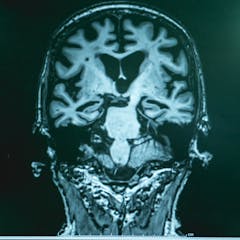
Articles sur Epilepsy
Affichage de 1 à 20 de 58 articles

Some scientists theorize that artificial intelligence may be able to deduce thoughts from EEGs.

A highly unusual new case is giving scientists insights about what causes illusions of facial distortion

What you don’t do: Don’t shout at them, don’t put things in their mouth and don’t let them get near things that are sharp or hard in case of a fall.

Shields said the seizure was caused by drinking too much water – which can be a cause in very rare circumstances.

Disorders such as Alzheimer’s and epilepsy are difficult to diagnose with only occasional doctor visits. A new approach would allow fathering of extensive real-world data directly from patients.

Most of us have heard of epilepsy. Lesser known to the public is that seizures can lead to an uncommon but fatal complication known as sudden unexpected death in epilepsy.

Seizures are like sudden electrical storms in the brain that can cause lasting damage. A set of immune cells in the brain called microglia may provide protection.

The 2022 Prime Minister’s Science Prizes have been awarded for outstanding achievements in scientific research, innovation and teaching.

People who had COVID were 55% more likely to develop epilepsy or seizures over the next six months than people who had influenza – but the overall risk is still small.

This technique could also be applied to other conditions, such as Parkinson’s disease.

People who get COVID continue to face increased risks of developing some neurological and psychiatric conditions, like psychosis and dementia, for up to two years afterwards.

AI algorithm that detects brain abnormalities could help cure epilepsy.

From figuring out where memories are stored to how sensory information translates to behavior, new technologies are helping neuroscientists better understand how the brain works.

Our team studied the activity of neurons in people with epilepsy. Neurons in the brain regions responsible for triggering seizures were much less diverse.

Because some seizures are relatively subtle, they can go unrecognized, leading to a delay in diagnosis.

A study of thousands of students hospitalised with an injury or illness confirms they are likely to fall behind their classmates. But good management and targeted help with learning cut the risk.

Deciphering the biological pathways behind rare genetic diseases often involves assembling a team of specialists to work closely with the family members of those affected.

Many people with epilepsy are unable to remember what happened immediately before they have a seizure. This may be because seizures and memory use the same pathways of the brain.

Genes and environments almost always combine to influence our risk of diseases. Research in twins has helped us understand how.

The molecule C1q has both protective and detrimental effects after traumatic brain injury. Blocking it after injury in mice restored normal brain rhythms during sleep and prevented epileptic spikes.
